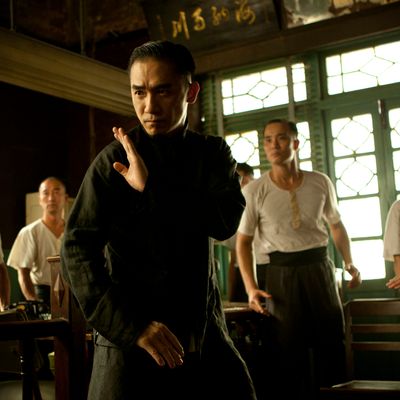
Wong Kar-wai’s kung-fu movie begins with an elaborate, very impressive fight between Ip Man (Tony Leung) and a small army of unnamed opponents, who come at him with the same relentlessness as the rain that thunders down on them. The kicking and the punching is predictably intense, but the scene, presented without context or setup, feels less like combat and more like an aesthetic statement of principles. As we watch the droplets of water spinning off the brim of Ip Man’s white hat in exquisite slow motion, the shadowy forms of the fighters conjoining and separating amid the backlit curtains of rain, the dancerly grace of the camera moves and the cutting, it’s hard not to feel that with this, Wong’s first feature since 2007’s misbegotten My Blueberry Nights, a dear old friend is finally back in the room.
Wong Kar-wai isn’t known for making martial arts movies; his one contribution to the related wuxia genre, Ashes of Time, is the most experimental thing he’s ever done. But he is a master of the physical — of texture and movement. And The Grandmaster is rooted in this very physical world. It begins in 1936, as an aging grandmaster from the north, Gong Baosen (Wang Qingxiang), who has united a variety of fighting styles, comes south to the town of Foshan for a retirement ceremony and asks that a younger champion from the south be chosen to challenge him. The challenger turns out to be Ip, a 40-year-old family man and Wing Chun expert whose mild manner betrays his encyclopedic mastery of practically every fighting style there is. (Ip Man, by the way, was a real person, whose main claim to fame is that in later years he taught a young Hong Kong kid named Bruce Lee.)
The grandmaster’s chosen successor is Ma San (Zhang Jin), a lethal hothead, but his true spiritual heir is his daughter Gong Er (Zhang Ziyi), who sorrowfully watches the men make their various honor-bound commitments, frustrated because she has mastered even the grandmaster’s most secret moves and is unwilling to accept her father’s defeat. All throughout, Wong stays focused on the faces, hands, and feet of the combatants — even when they merely cut through air, we can feel that air. He’s also predictably intoxicated by the smoky, ornate pavilions of this world. Much as with his forebears Joseph von Sternberg and Luchino Visconti, cinema for him is as much a conjuring act, an evocation of worlds gone by, as it is a narrative art.
And for this director, memories of bygone worlds usually also contain memories of passion. When Gong Er does get her chance to fight Ip, their faces cross within inches of each other as they fly through the air, making the confrontation one of sunken desire more than overt conflict. We realize that there isn’t much difference between the stolen glances and caresses of Wong’s romantic dramas like In the Mood for Love or Chungking Express and the delicate footwork and sweeping punches of kung-fu. In his hands, a fight becomes an act of yearning. Soon enough, Gong Er and Ip Man are in love — or at least, in the kind of submerged, impossible love that people share in Wong Kar-wai movies.
Like many of the director’s films, The Grandmaster is paced in an odd, almost stream-of-consciousness manner. The first act so closely follows the minute, and in some cases seemingly petty, intricacies around the elderly Gong Baosan’s retirement that one could be forgiven for assuming the rest of the film will continue in this closed, politically and personally charged setting. But actually, the film turns out to be a historical epic — expanding out from this concentrated moment in time to encompass the following decades of invasion, civil war, and revolution. The characters go their separate ways, but then wind up in fifties Hong Kong, their noble days amid the billowing incense and luxurious golden pavilions a distant, otherworldly memory. In its later scenes, the film often feels episodic and disjointed, in part because it’s following on the detailed, fussy narrative of those early scenes. But, given the meditative quality of the storytelling, this fragmentation is clearly by design, the characters’ fleeting reminiscences and brief reconnections serving to advance Wong’s dreamlike ode to regret.
The Grandmaster shares yet another quality with many of Wong’s other films in that it’s hard to pin down just exactly what cut we should be watching. The film is being released in the U.S. in a new version prepared by the director himself that toys, to a not insignificant degree, with the structure. The longer international version of the film has far more sweep and breadth to it, and I’d be lying if I said there weren’t several magnificent scenes in it that I’m sorry to see go. But the U.S. version, which is tighter and less linear, also contains a couple of powerful new scenes. In short, I’d be the happiest person in the world if Wong announced there was a four-hour cut of this film somewhere. For now, neither version is perfect, but they’re both so beautiful, so heartbreaking, that the question may be moot. Whatever its flaws, seeing The Grandmaster theatrically, in any version, should be a sacrament for any true film lover — a spiritual duty.


